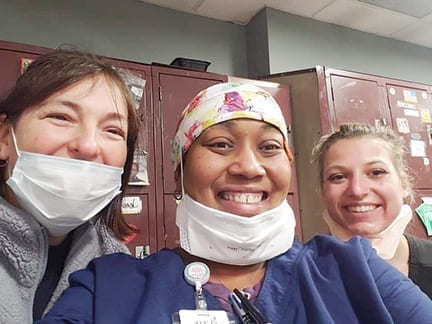By Vivian Shipe
KNOXVILLE, TN — Shetera Weaver is from Knoxville, a graduate of Austin-East Class of 1993. She is an African American traveling RN nurse for the last 25 years and has gone where she is needed. Little did she know when she reported to New York in January, just how needed she would be.
In February, COVID-19 first started rearing its head. In the hospitals, the nurses and staff were getting sick, but it was during flu season and no one had heard of the coronavirus then…so no one pressed the issue. There were no travel restrictions in the beginning so many who lived in other areas were traveling back and forth. That changed as the virus reared its head in such a way that people became aware something unseen and deadly was moving across the earth.
Now you can only travel a 60 mile radius back and forth to work. If you lived farther away, you had to make closer living accommodations. Nurse Weaver lived in an extended stay while working in New York. Her 12-hour shifts were long with two, maybe three days off in between. When she was off, she as many others in the health care field would sleep that whole time, eating and reading an occasional book. She did not want to go out; all she wanted to do was disconnect. When she was off she could exhale. Not so at the hospital.
On duty meant morning updates from the medical director. It meant learning so many new procedures that sometimes, “I felt my head would swell” said Weaver. The doctors were desperate to try what ever would help save patients. Intubating, ventilators, rolling patients from their side, laying them on their stomach to help their lungs expand. They were desperate to stop lungs filling with blood, clotting, strokes and heart attacks… trial and error as what worked for one patient did not work for another. The hospital created its own tracking procedures. Every time you entered a room you wore masks, shields, N95 mask and gloves. Before you entered that ER room, you signed a clipboard hanging on the door, you put your name and phone number and listed everything you had on. Should that patients test come back positive for COVID-19, you would be notified by the hospital command center that you had been exposed. Every time you left a room, you put on all new PPE (personal protective equipment). Every effort to stop the spread was being used. Nurses were tired and hungry. They were working two and three shifts. Nurses who were pregnant were removed from patient care as there was no research on how the virus would affect the fetus. It even got difficult to get food to eat and the mental strain was too much for some.
“In the beginning we ordered food and it was delivered.” she said. “Then, some restaurants refused to deliver to the hospitals, they even refused to deliver to the parking lots, then everything shut down.” A sisterhood developed. “We started doing pot lucks and bringing foods we could share.” Weaver spoke of the PTSD that wears on the medical professional, remembering the doctor who committed suicide and a medic who also took his life with his fathers gun. Mental health is available thru EAP, Counseling, and Chaplains. Nurse Weaver said, “When do we have time to take off? When do we have time to go talk to someone? “Its real,” she sighed. The mental health of the patients is another issue the nurse must deal with. “No one can come and visit these patients. We use tablets and laptops so families can Facetime us to make decisions, see their family members and we are the ones who deliver the news when a family member dies. We are the ones with them when they pass.”
Her voice hardens when she speaks of those who take lightly the recommendations of wearing masks, washing hands for 20 seconds and social distancing. “This disease does not discriminate!” When it first hit you heard it was only the older populations or those with immune issues.” I have seen patients as young as 27 years old.”
From reports from CDC, John Hopkins, and WHO; there are also indications of change in the disease and its symptoms from “Covid Toes” to diarrhea. There is other news emerging as Kawasaki Syndrome and Pediatric Multi System Inflammatory Syndromes, with 15 cases that have surfaced in New York, are further indications the disease is not limited to the elderly. Weaver encourages the public to read the reports for themselves to be educated on what is truly going on. She encourages people use the discernment God gave them and listen to the scientist also.
Home for two weeks before returning to the “war zone,” Shetera wanted the following emphasized. “This is real and its not going away any time soon. Follow the rules: wear a mask, wash your hands, be vigilant!” “You don’t have to live in a bubble: if you feel sick, go to the ER, don’t wait till your symptoms are at their worst. In my 27 years of nursing, I have never seen anything like this. I truly wish that in the beginning they had declared martial law, from the east to the west of the whole country. I believe we will have a surge, when it will hit I don’t know. Act now, to prevent the demise of our loved ones in our families, our communities and our churches.”


